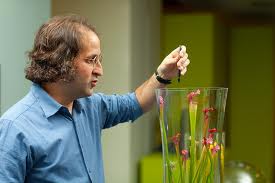Chili Peppers: Heat and History
 Joseph Rucker
Joseph Rucker
Synopsis: Chile peppers are one of the most notable gifts of the New World to the Old. The global spread of chile peppers altered world cuisine, giving us everything from moles to masalas. Just as important, the "heat" of chile peppers provides a window for understanding the sensations of pain and temperature. In this spicy illustrated talk, biochemist Joseph Rucker will share his personal interest in the history and science of chile peppers.
Joseph Rucker is Director of research and development at Integral Molecular Inc., a biotech company located in the University City Science Center. Rucker conceived the idea to use retroviral pseudotypes as biochemical tools and was the first to use them in biosensor analyses.
In a serendipitous discovery while working with scientists from the Monell Center, Rucker discovered a compound called probenecid that inhibits bitterness by acting directly on a subset of bitter taste receptors. In vitro studies revealed that probenecid does not physically block interaction of bitter molecules with the receptor's primary binding site. Rather, it appears to bind elsewhere on the receptor to modulate the receptor's ability to interact with the bitter molecule. "Probenecid's mechanism of action makes it a useful tool for understanding how bitter receptors function," said Rucker. "This knowledge will help us develop more potent bitter taste inhibitors."
One of Rucker's hobbies is the study of carnivorous plants.
The luncheon is at 12:00 noon on Monday, April 23, 2012 in the Lenape Room of the University Club.

